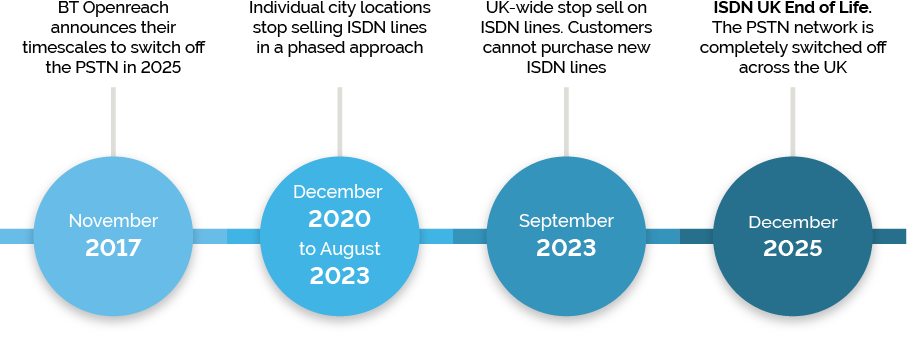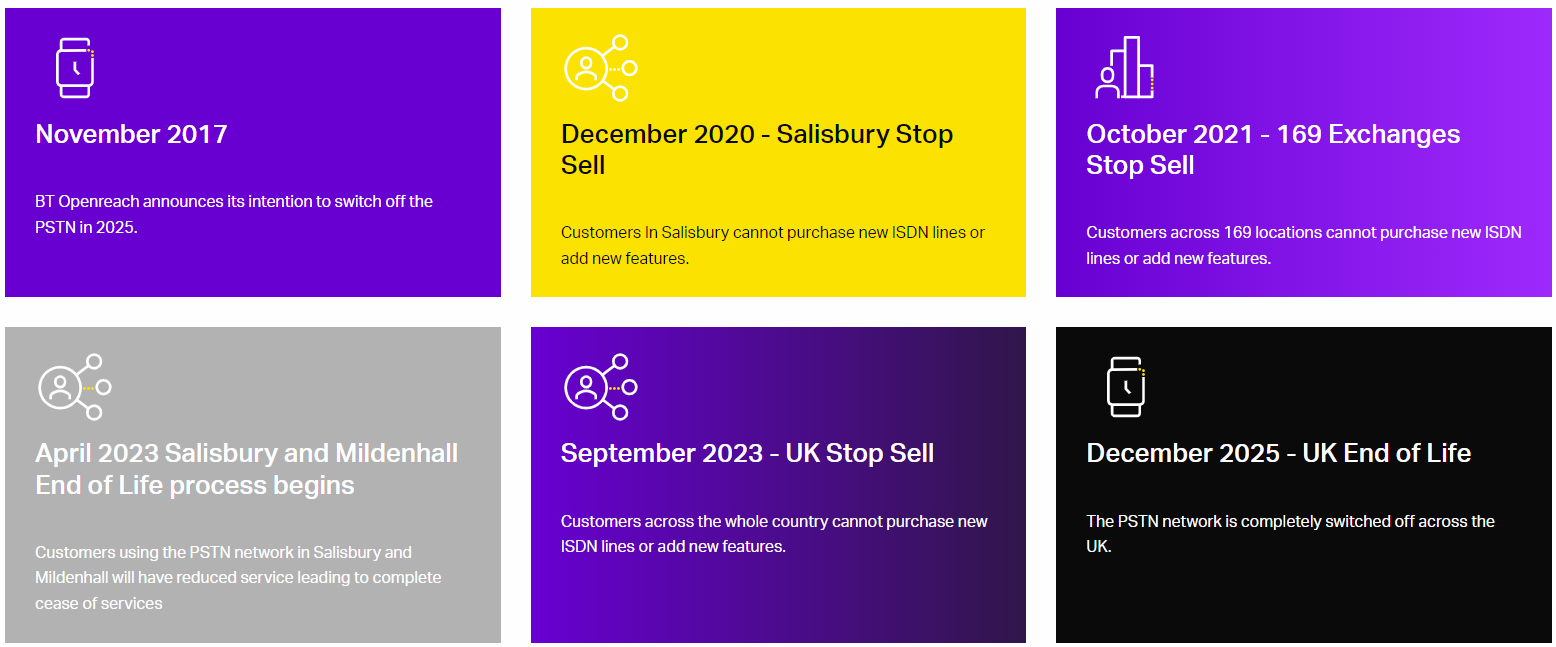

The ISDN and PSTN Switch Off is in full swing, with the network fully turning off by 2025.
Although not officially happening for another couple of years, this will start to affect you and your business now. It is key to know and understand the alternative forms of communication. BT alone has around 2 million ISDN users that will be affected by the switch-off, so assessing your options now is vital.
As of today, there are less than 900 working days until the final switch-off in December 2025. And even sooner, is the last day you can renew, which is September 2023. Meaning the time to switch is running out!
So, what are PSTN and ISDN?
PTSN is a Public Switched Telephone Network. It refers to the telecommunications network which allows subscribers at different sites to communicate by voice. It was first introduced back in the 1800s and it will enable information to be transmitted through a network of copper wires.
Traditionally known to most of us as the landline.


ISDN stands for Integrated Services Digital Network. It is a group of communication standards that use the digital transmission to make phone calls, video calls, transmit data and other network services. Simply put, it is the main carrier and most common way of making phone calls across the world.
The announcement to shut off all ISDN and PSTN in 2015 was caused by voice calls being made over the internet more and more often. Neither ISDN nor PSTN can deliver the volume or the quality of voice data needed in this increasingly digital world.
Why is it being switched off?
In simple terms, the network is outdated. Broadband and internet speeds are a lot faster and operate at a much higher level than ISDN, so it can no longer compete with the demands of modern businesses. Traditional ISDN lines offer little flexibility and require people to be in a physical location to access communication lines, which is happening less often.


Moreover, a large reason for this change is due to the recent investment in fibre infrastructure. Whilst analogue data (PSTN and ISDN) is sent over copper wires, fibre optic cables allow digital data to travel through fine hair-like glass fibres, by carrying light transmitted by an LED or laser. Ultimately, it doesn’t make financial sense for BT to keep making improvements to the ISDN when there are so many competing factors. BT can now focus its resources on up-to-date technology like VoIP, concentrating on building solutions for the future whilst meeting these growing demands from businesses.
Internet-based solutions are the top alternatives, but that doesn’t mean this is the best decision for you. Get in touch with our experts to find an option best for you and your business.
VoIP
VoIP is Voice over Internet Protocol which is a technology that converts your voice into a digital signal. This allows you to make a call directly from a computer, VoIP phone, mobile app, or other data-driven services.
In more simple terms, it is a phone service delivered over the internet. Meaning you can make and receive phone and video calls digitally.


This helps businesses become more efficient by enabling flexible work environments through; hot-desking, home working and extending the service to mobile devices. It also comes with a lesser price tag as there is less competition with other people for data carriage. You also don’t have to purchase additional hardware or extensions to scale your operations as it is all digital.
Collaboration becomes easier with VoIP as you can share calendars, presentations, and desktops, and send instant messages. You can also hold conference calls, install call queueing and collaborate with your team by sending videos, photos and documents (all whilst still in a conversation!).
Cloud-based VoIP services let you make calls from anywhere, using any device. You are no longer restricted by physical phone lines and can take calls and connect with people from anywhere.
SIP
Sessions Initiation Protocol (SIP) is a set of rules that are used in multimedia communications to initiate and terminate data transfer between users. Essentially, it enables VoIP by managing the elements of the call and the messages which travel between endpoints.
A SIP channel roughly equates to the digital version of a phone line.
Risk to organisation
According to the ‘Switch on to the Switch Off’ survey in March 2021, 83% of organisations indicated they had no visibility of when their services would be switched off. 46% said they had no idea their ISDN phone services will be switched off by December 2025.
A significant number of changes will be taking place from 2022 onwards, affecting all main carriers, not just BT. This change will mean that businesses are potentially going through some big changes to their collaboration tools.


Positive changes
The ISDN Switch Off overall is positive. Moving to VoIP/ SIP service will ensure organisations reduce their spending, improve resiliency and work in a more agile way. Workers can work from wherever suits them and still have phone access.
This means employees can work in a way that suits them, and still collaborate with their team effectively.
Moreover, employees are often juggling many tasks at once. Moving to a VoIP / SIP solution will also help your organisation to streamline its current communication strategy. Through our strategic partnerships, we can deliver phone systems integrated with a number of widely used tools (i.e. Microsoft Teams, Cisco Webex, Salesforce, Microsoft Dynamics, HubSpot, etc.). This will unify your communications, leaving you to do what you do best!
For more on the best collaboration tools, get in touch with our team or check out our services.

